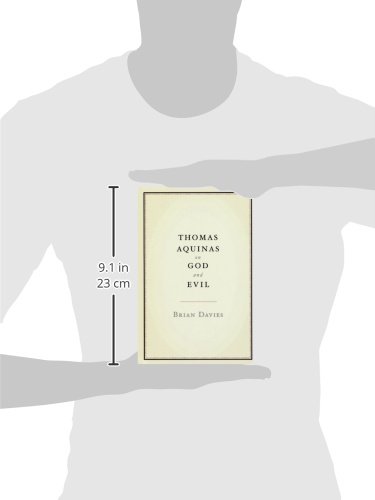



Full description not available
J**E
True love
Good read, Thomas Aquinas views connects the reader with God Aristotle, Plato, and what are the norms of true Christians.
K**A
Good Introduction to God and Evil
The reason I found this book helpful is because it does a pretty good job presenting Davies' interpretation of Saint Thomas Aquinas' view on God and evil, although I have not studied Aquinas' view any further than casually reading his book, Summa Theologica Book One. Davies thinks that Aquinas' approach to God and evil is the correct one. Davies examines and explains both what Aquinas meant to say and what he did not mean to say. Davies compares Aquinas' view on things such as good and bad, existence and essence, and occurring naturally and occurring accidentally. "For something to have essence, Aquinas thinks, it actually has to exist." He helps the reader to understand certain terms Aquinas uses such as esse, actually existing without being the source of its being actual. The word 'malum' is used when making reference to evil or badness. Malum ponenae refers to evil suffered, and malum culpae refers to evil done, both of which are not directly caused by God. In my opinion, the book falls short on examining different types of bad, evil, and suffering, or rather, perhaps Aquinas fell short on examining various cases of bad, evil, and suffering. There is a type of suffering for righteousness that is done with all strength and joy, which is not explored at all. The concept of 'satan' and the 'devil' is not mentioned at all, which is quite odd when trying to talk about evil. It sounds as though Aquinas is extremely cautious not to belittle evil and what to do about it. However, in my opinion, we can't dance around evil or avoid tackling it head on. The emphasis is more on how God exists in spite of there being evil in the world, and that God does not cause evil directly, and that God is still the highest good. For anyone who wants a lot of good facts about God and evil, or anyone who wants to get a taste for Aquinas' view on the matter, this book is pretty good.Author Brian Davies provides a large amount of interesting notes in the back 1/3 of the book. It is a good mix of sources, definitions, analysis, and opinions. This book is a good introduction to God and evil, but not necessarily how to handle it or what to do about it.
D**D
... Davies as it is a lucid introduction to Thomas' brilliant explication of God
I have chosen to use this book by Brian Davies as it is a lucid introduction to Thomas' brilliant explication of God, Good, an Evil as part of my course on "The Philosophy of Good & Evil" [PHL 480] in the School of Contuing Education, Providence College, R.I. during the Fall Semester, 2017. I am excited about relying upon this study because it unveils just enough of Scholatic Theology for non-theolgians, while keewpin with Aquijas' own focus on a philosophical approach to both Good and Evil.
A**T
Brian Davies writes an excellent exposition of Aquinas' thinking on this subject
Brian Davies writes an excellent exposition of Aquinas' thinking on this subject, compiling quotes from a variety of sources. It is written for a lay person who is neither an Aquinas scholar nor a theologian, and incorporates Davies' dry sense of humor. An excellent read for one wishing to learn more on the subject whether a novice or steeped in Aquinas' thought.
J**A
Davies' book is accessible, clear, and thorough. It's also correct.
Davies' book is accessible, clear, and thorough. I found his approach in this book to be very systematic and it did not assume too much background knowledge on the part of the readers. Also, his chapter summaries at the end of important material helped me to see the big picture. I came to this work after reading his 2006 book, "The Reality of God and the Problem of Evil."It reads quickly. Professor Davies has a knack for summarizing complicated ideas in succinct fashion, providing helpful illustrations and examples where necessary. I thoroughly enjoyed the material on the life of Christ.Davies does a nice job of explaining several key ideas:1) The God of Aquinas (and classical theism in general) is not a moral agent, and so He does not have a moral case to answer.2) Evil in the world does exist and is not a trivial matter.3) There are important questions concerning God's causation and creation and the existence of evil, and Aquinas writes specifically about these.Overall, it is a great book that I will use as a reference for years to come.
G**E
Clear, accessible account of Aquinas’s thinking on God and evil
Davies book is a clearly written, economical explication of Aquinas’s thoughts on God and evil. He takes up passages and arguments from all over Aquinas’s corpus and gathers them together into a systematic account. It’s very accessible and packs a lot into a short book (it’s about 130 pages, not including the footnotes).His goal is, I think, in large part to show how Aquinas might have addressed what is commonly called “the problem of evil”, that is “how can God–who is thought to be good, loving, omnipotent, omniscient, etc.–allow evil in the world?” As Davies presents it, Aquinas offers a convincing argument for why the existence of evil is not incompatible with the existence of a good, loving God.He first has to spend some time clarifying and developing the philosophical machinery Aquinas uses (e.g. what is being, good, evil, cause, what can we know about God?) before addressing the major questions about God and evil. In doing so, he covers a lot of territory, making this a good introduction not just to Aquinas on God and evil but to Aquinas’s thought in general.Davies says in the preface that he wants to “offer an account of Aquinas’s teachings on the topic of God and evil while trying to place him in the context of contemporary discussions”. It’s an account which is very different from those espoused in most contemporary discussions, and one well worth reading.
Trustpilot
1 month ago
2 weeks ago